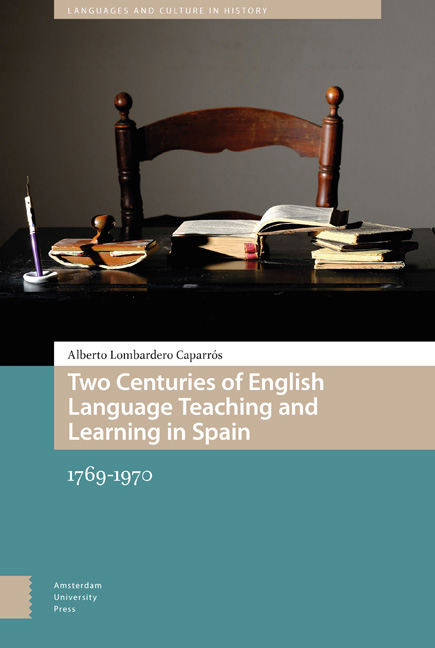2 - ELT in Spain (1850-1910), Further Development
Published online by Cambridge University Press: 21 November 2020
Summary
Abstract
This chapter delves into the development of English language teaching and learning in Spain between 1850 and 1910. After a look at the official educational legislation in that period, which became more explicit for English language teaching, a thorough account of the most significant authors and their manuals is given, bearing in mind their underlying methodologies and how, in some cases, they corresponded to those of their mainstream European counterparts. Since the presence of English tuition was on the increase in this period, there is ample mention of both the official institutions and private academies that provided it in Spain. Lastly, some relevant theoretical works have been selected in order to better gauge how English and other foreign languages were taught and learnt.
Keywords: ELT, Spain, Franz Ahn, Heinrich Ollendorff, T. Robertson, Eduardo Benot
Introduction
As seen in the previous chapter, the implementation of ELT in Spain was a slow-moving and heterogeneous process mostly adopted by private institutions and geared towards the elites at a time when formal education, especially primary and secondary schooling, was in its infancy.
However bleak the situation was, ELT gradually progressed, especially in the period covered in this chapter, leading to a somewhat stronger position as far as the steady publication of English manuals is concerned. Two factors came into play which account for the surge of a wider interest in learning English. Firstly, private institutions increased their offer in modern languages spurred by an emerging bourgeoisie and, secondly, formal education became a more established reality with the implementation of formal primary and secondary schooling. Thus, the scope of modern language teaching widened, encompassing both private and official educational institutions. However slow this implementation would be, it would prove to be relentless.
Special attention will be given to the main actors involved in the introduction of ELT such as official legislation, authors and their manuals (underlying foreign language methods), institutions and theoretical studies (i.e. public speeches, press and academic articles), which advocated the study of modern languages, laying special emphasis on the English language.
- Type
- Chapter
- Information
- Two Centuries of English Language Teaching and Learning in Spain1769–1970, pp. 67 - 110Publisher: Amsterdam University PressPrint publication year: 2019

